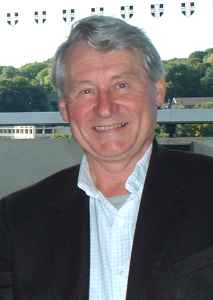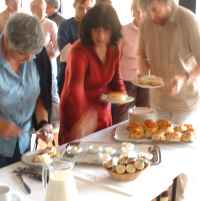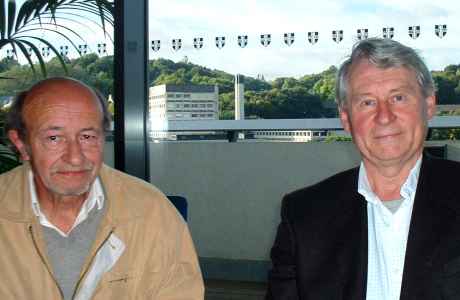
French poet Jacques Darras presided benignly over a Literature Festival novelty, the very English ritual of afternoon tea, with scones and cream. The French have a word for this: it is "le five o' clock"; Michael Standen, performing the introductions on behalf of the event's co-host, Colpitts Poetry, noted that the word five is pronounced, not in the French style, but with an impeccably English vowel.
But then Jacques Darras is not so much an Anglophile as a European (his most recent collection is Moi, j'aime la Belgique) and a man of the north. He began his talk by drawing a parallel between Durham and his home city of Amiens; the two northern cathedral cities, one Norman, one Gothic, at the hearts of twinned counties. This, he announced, was to be an afternoon in B major: in the city of the Venerable Bede, he would talk about Basil Bunting (whose poem, Briggflatts he had translated into French), about Belgium and its capital, Brussels, touching finally on the Swiss city of Basle. Think of the afternoon, he said modestly, not as Darras in Durham, but as "from Basil to Basle." This relish for the sounds of words was to be evident throughout the afternoon, from his Franco-Cumbrian imitation of Basil Bunting's speech to his final virtuoso performance - but that comes later.

Jacques Darras explained how he had come to northern England by a circuitous route, via Scotland: he had been a modern language assistant at the University of Edinburgh in 1963-64, "and of course the best way to understand a country is through its poets." So he began to translate such Scottish poets as George Mackay Brown, whom he travelled to Orkney to meet ("I've never met such a delicious man; he had the bluest eyes...") and Sorley Maclean. Heroically, he rendered Hugh MacDiarmid's A Drunk Man Looks at a Thistle into Picard. His reading of the American Objectivist poets brought him eventually to Basil Bunting, and to his translation of Briggflatts - and then he needed to meet the poet, to ask him to explain words like "fell". Eventually he not only met him, but walked on the fells with him, and came to love the man as much as the poetry.
"I'm a northerner in France, too," announced Jacques Darras, and paused, because this is not something you admit to in France. You hide it, you claim to come from somewhere else, probably Paris. This was because Arras had been Flemish until 1650, when it was captured by siege, and subdued, the Picard dialect suppressed. Later, the discovery of coal smothered the north again; it became a black region in every sense, one from which nothing joyful, nothing springlike, could possibly come. But in the middle ages, Arras had been a prosperous and brilliant city, a cultural centre. It was home to poets like Adam de la Halle, whose Jeu de la Feuillée (The Play of the Greensward), an early piece of secular theatre, he translated into modern French. Another, Jacques d'Amiens, who translated Ovid's Amores into French, he claims to regard as a namesake, although a better term might be alter ego.

Throughout the afternoon, Jacques Darras's readings of his own poems in French were followed by his own translations into English, read by Colpitts Poetry's Michael Standen and Michael Ayton. The choice of poems appeared to have been made with consideration for an anglophone audience. The poem, Jacques d'Amiens, begins:
la bibliothèque bruitThe combination of simple language, repetition and wordplay is reminiscent of Jacques Prévert: it is also as accessible as possible to a reader with a small knowledge of French.
la bibliothèque bruit d'un frisson de pages
quelques livres s'ouvrent
des dictionnaires s'ouvrent au verbe ouvrir
á la forme réfléchie
(The library rustles
the library rustles with a quiver of pages
some books open
dictionaries open at the verb to open
in the reflexive form)
The next poem was a tribute to Belgium, prefaced by generous praise of that often undervalued country. Even the Belgian joke (the French equivalent of the Irish joke) was given a benign interpretation, with the claim that many of these jokes may actually originate in Belgium, that "Belgium for me is France with a sense of humour." The claim that Moi, j'aime la Belgique is deliberately provocative, but it is more than a declaration of affection for a country where the pace of life is slower than the caffeine-fuelled frenzy of Paris, for its "wide, slow, peaceful rivers". It also expresses a certain understanding of what it means to be European, demanding the right to be at home anywhere in Europe; "Nous entrons dans un monde de nationalités d'emprunt" (we are moving into a world of temporary nationality, of nationality by choice).
This personal manifesto was followed by a poetic manifesto, a denial of Shelley's belief in inspiration: poetry does not descend from above, from some spiritual and external muse, poetry starts with the chair you are sitting on. This may seem simple and practical, but for his final reading Jacques Darras chose a bravura piece which had nothing simple about it - and on this occasion, the English readers were excused. The audience was assured that this would not be a problem for them, that Jacques Darras had performed the poem in Mexico in front of a crowd of 1500 people, and there had been no language barrier. It was an attempt to revive "l'oralité", spoken or performance poetry. It brought us round to the last B of the afternoon, to Basle in Switzerland, where there is a museum dedicated to the late Jean Tinguely, sculptor of elaborate contraptions: the poem imagines Tinguely repairing one of these, and there is an audio version linked from the front page of Jacques Darras's web site.
 |
 |
| Previous report: Ben Haggarty |
Next Report: The Young Visiters |

